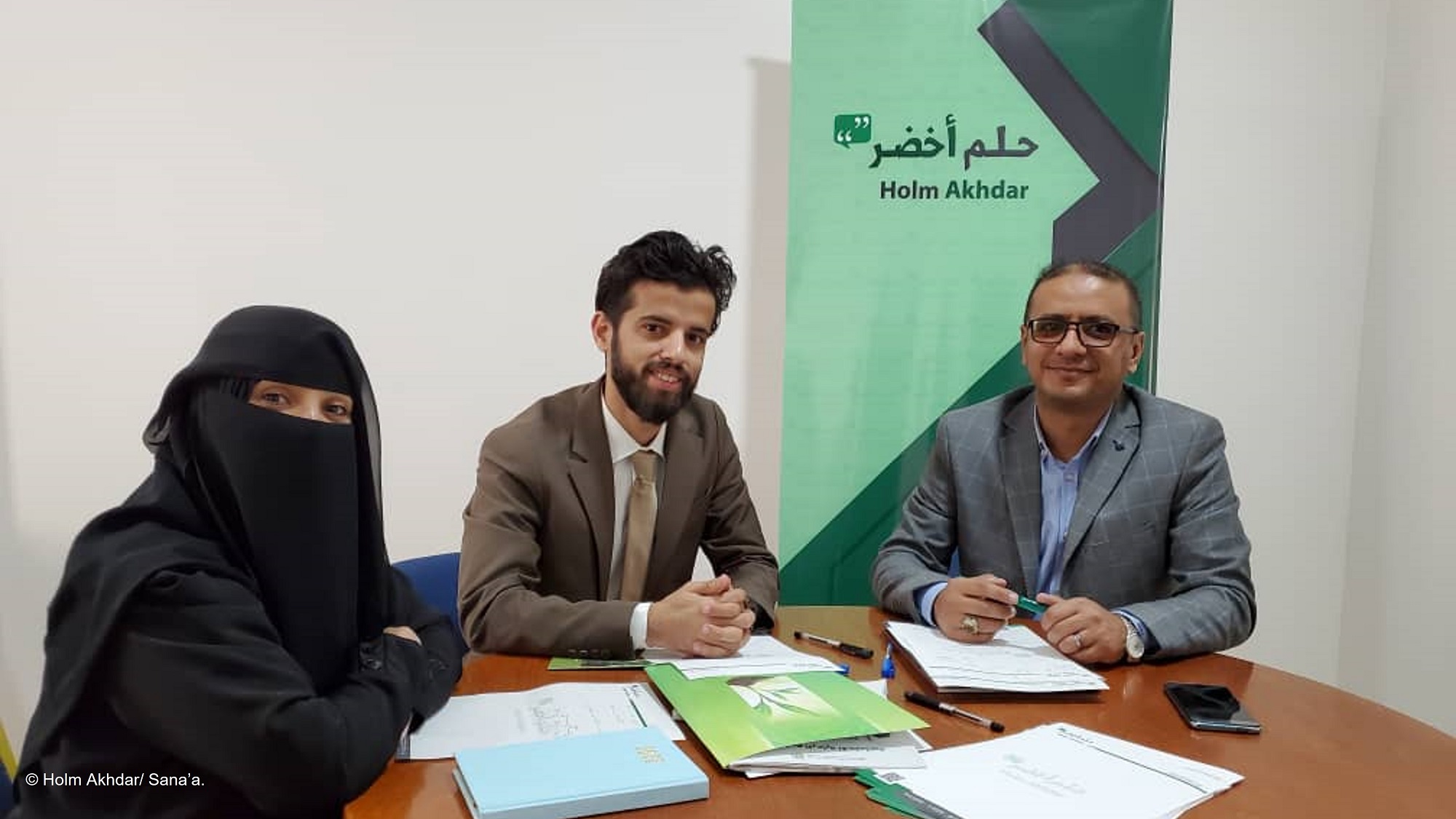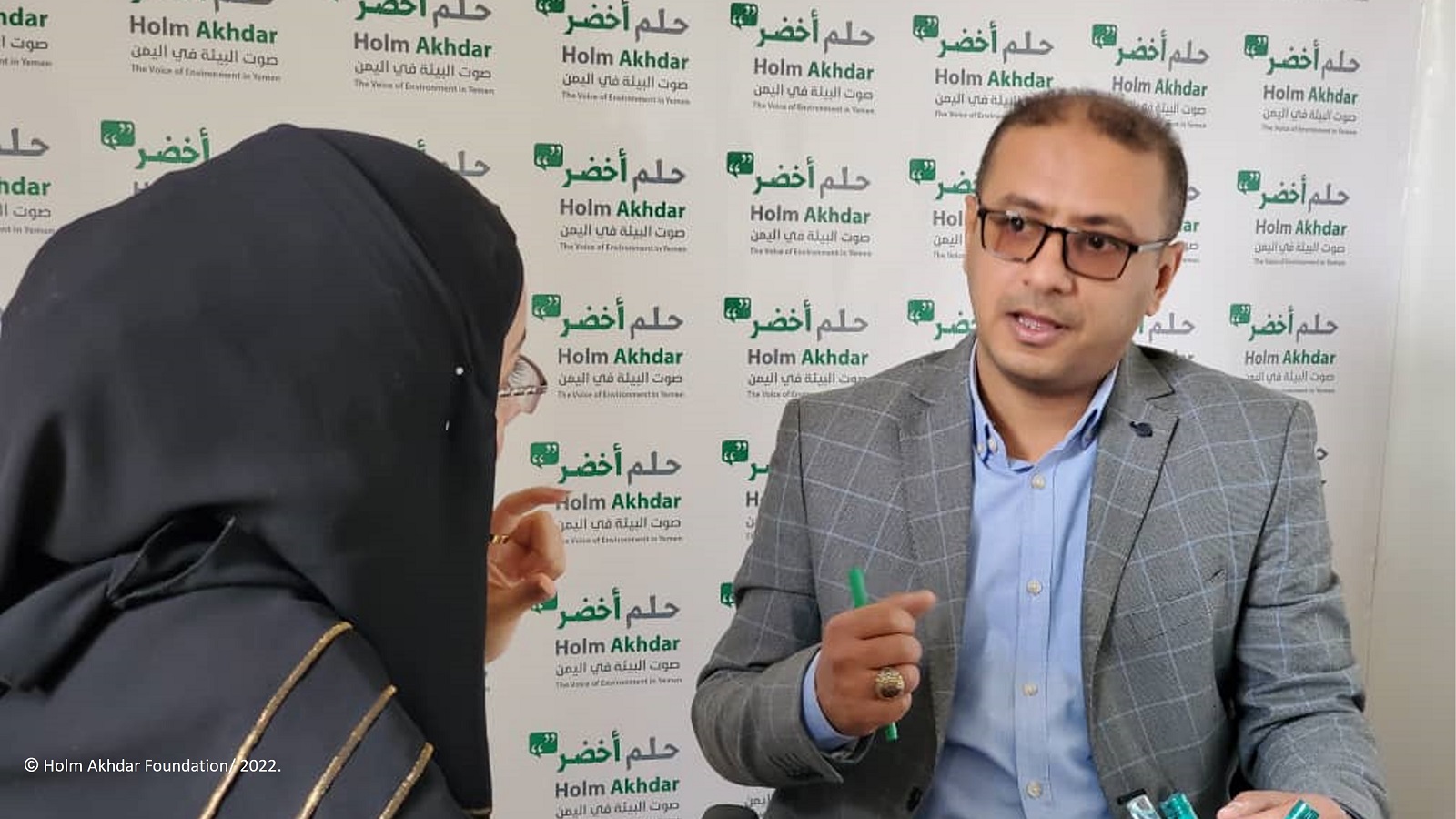By: Samar Abdullah (Arabia Felix Magazine)*
The Holm Akhdar [whose name means Green Dream in English] is an independent platform for investigative reporting on environmental issues in Yemen. Founded in 2012, it has become an authoritative source of environmental stories about climate change, biodiversity, illegal land use activities and sustainable development in the country.
In addition, the website promotes awareness campaigns about vulnerable communities, offers solutions to local environmental problems, and lobbies decision-makers to take supportive action.
The Holm Akhdar team is made up of Yemeni environmentalists, reporters, activists and researchers. Journalist Mohammed Al-Hakimi, 39, who heads the group, says a harmonious relationship with nature is an integral part of coexistence that directly impacts the daily lives of Yemenis.

Arabia Felix Magazine: What motivated you to launch the Green Dream [Holm Akhdar] platform?
Mohammed Al-Hakimi: I wanted to draw attention to ecological issues in Yemen that have been largely ignored since the beginning of the political crisis in 2011. This negligence, along with a lack of awareness, has contributed to a steady deterioration of the natural environment.
We investigate reports from individuals about wildlife poaching, illegal logging, and natural disasters. Once we verify such incidents, our team monitors the impacts of community efforts to address these issues and hires local experts for advice.
Arabia Felix: What can you tell us about the gender makeup of the Holm Akhdar team?
Al-Hakimi: Women have a prominent presence in the [Green Dream] Holm Akhdar project. Four researchers on the core staff are women, and three more are on the associate team of writers and broadcasters, with four serving as technical fellows and assistants. Our content is consistently gender-inclusive.

Arabia Felix: What are your biggest challenges?
Al-Hakimi: The greatest challenge is the difficulty of working amid war. The risks are high, and our need for a larger team means a significant financial burden in the absence of sustainable support.
Arabia Felix: How can environmental journalism promote coexistence among people and with nature?
Al-Hakimi: By raising awareness on the importance of ecological integrity and resource conservation to ensure respect for environmental rights and justice for all.
Arabia Felix: The Fermahin Reserve on Socotra Island suffers from unsustainable land use. How does this problem impact coexistence?
Al-Hakimi: The excessive use of natural resources leads to poor distribution and unequal access among the population on the reserve, especially in the absence of regulatory legislation that limits these practices.
Arabia Felix: Your coverage of the impact of environmental hazards revealed an aspect that concerns sanitation workers. Can you tell us more about that?
Al-Hakimi: Cleaners are most impacted by health hazards since they are in direct contact with disposed materials. We have addressed this in our awareness campaign, specifically the dangers of medical waste and its effects on sanitation workers.
Ignorance of these risks and the failure of authorities to provide these workers with protective gear is a problem. Attention to this vital aspect of environmental work helps break down social stereotypes around this occupation and offering protection will make a significant difference.
Open landfills in Yemeni cities have a host of threats affecting the entire ecological system, including food and water safety and the health of communities.This catastrophe is to remain unresolved as long as the humanitarian crisis keeps aggravating.
Our latest video #HolmAkhdar pic.twitter.com/eoIRjtQFq3— حلم أخضر Holm Akhdar (@holmakhdar) November 20, 2021
Arabia Felix: What achievements of the Holm Akhdar’s projects are you most proud of?
Al-Hakimi: Our work has had a meaningful impact on environmental policymaking nationwide. Officials have reached out to us following the publication of our reports and videos on various environmental issues, including climate emergencies and the poaching of endangered wildlife.
Holm Akhdar was the first Yemeni organization to spotlight the FSO Safer oil tanker, with its load of more than one million barrels of crude oil. The ship has been anchored in the Red Sea since 2015 without any maintenance. Local and international attention followed our warning, including cooperation with Greenpeace, which shared our information on its website and social media pages. These were widely circulated by major news agencies, which outlined the heavy environmental and economic toll that would befall Yemen should an oil leak on the tanker occur.
The fishermen and farmers are potential subject to imminent sea disaster, in the event of oil spills from the dilapidated #FSOSafer oil tanker, abandoned off the Yemeni coast in the Red Sea.
Video by: #HolmAkhdar
FSO Safer: The Economic & Humanitarian Impacts#SalvageTheSAFER pic.twitter.com/jNAmKQiquv— حلم أخضر Holm Akhdar (@holmakhdar) March 2, 2021
“The role of Holm Akhdar in addressing environmental issues was also highlighted in a paper on the media’s role in peacebuilding in Yemen, published by the Center for Applied Research in Partnership with the Orient (CARPO) in Germany, in cooperation with the Deutsche Gesellschaft für Internationale Zusammenarbeit (GIZ).”
In Yemen, the intersections between the #ClimateCrisis & war is a big environmental story that needs coverage. Enter EJN grantee @holmakhdar, whose work led to policy change in Yemen's most biodiverse region. #WorldNewsDay @WND2021 @WorldEditors @cjffjc https://t.co/CeThVhtsjt
— Earth Journalism Network (@earthjournalism) September 28, 2021
Arabia Felix: What are Green Dream’s [Holm Akhdar] future plans?
Al-Hakimi: Holm Akhdar plans to shed light on forgotten rural communities in support of national, regional and international efforts to achieve Yemen’s Sustainable Development Goals (SDGs) by 2030. We look forward to collaborating with international research agencies and groups interested in supporting environmental work in Yemen.
* Source: Arabia Felix Magazine, issue No. (4) / Jun 2022.
** The Arabia Felix Magazine is produced by Media in Cooperation & Transition (MiCT) in the framework of the “Peace Process Support for Yemen” (PPSY) project implemented by the Deutsche Gesellschaft für Internationale Zusammenarbeit (GIZ).
